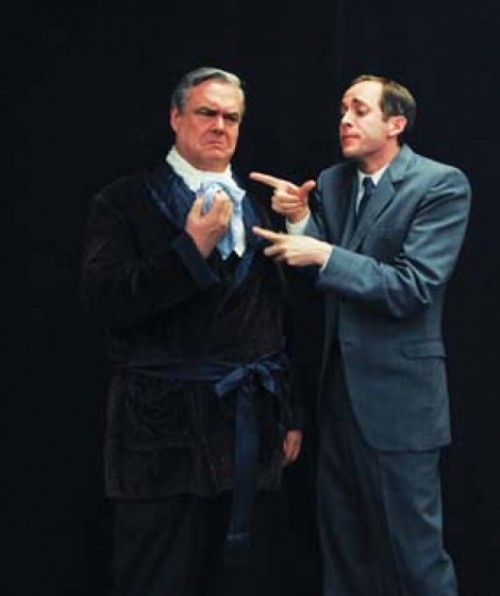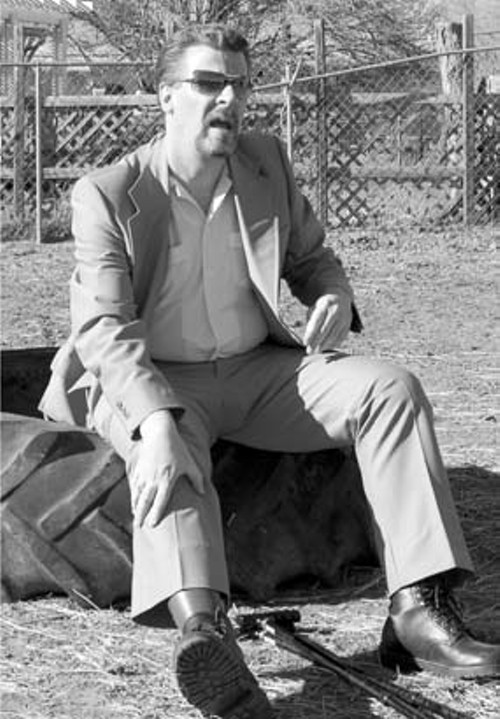The Producers
There are some American musicals so thoroughly entertaining that it would take an act of gross incompetence to screw them up—The Sound of Music, My Fair Lady, Chicago. After just a handful of years, it feels as though The Producers has already joined them.
Mel Brooks’ multi-Tony Award-winning adaptation of his own 1967 film may be the product of Brooks’ anything-for-a-yuk Borscht Belt sensibility—political correctness is decidedly not part of this show’s worldview—but you’ve got to give the guy credit. In his first stab at the stage, he understood that great tunes and infectious enthusiasm for the genre could create a work of lowbrow high-art.
Pioneer Theatre Company’s artistic director Charles Morey most assuredly is not grossly incompetent; in fact, he’s probably at his best as a director when working with comic fare. And there’s comic gold in this story of down-on-his-luck Broadway producer Max Bialystock (Kevin C. Loomis) and meek accountant Leo Bloom (Michael Keyloun) hatching an unusual scam. They’re going to raise $2 million, then put on a surefire flop of a play, one so gloriously awful that there’s no way they’d ever have to pay back their investors. And when the script is a paean to Der Führer titled Springtime for Hitler, the odds would seem to be in their favor.
Morey and choreographer Patti D’Beck take many of their cues from Susan Stroman’s original production, retaining several of the most memorable bits: Bialystock’s walker-tapping little-old-ladies; Springtime for Hitler’s swastika-shaped chorus-line finale; the puppeteered pigeons of Hitler-loving playwright Franz Liebkind (Max Robinson). Resident set designer George Maxwell creates a variety of bright, terrific movable pieces—the gaudy apartment of flamboyant director Roger De Bris (Dale Hensley) is a particular winner—and Morey generally finds smooth transitions between them. It’s a safe interpretation, but also a smart one in its “get out of the way” wisdom.
Only one decision doesn’t quite pay off: casting PTC regular Robinson as Franz. While for many of the roles in The Producers over-the-top generally seems about right, Robinson indulges his broader tendencies just a bit too far. But Loomis effectively finds his own space in the shadow of Nathan Lane’s defining interpretation of Bialystock, and Keyloun actually improves on Matthew Broderick’s Bloom. The Producers may border on impervious to harm, but creative people who understand that reality can let it work its magic. —SR
Sordid Lives
As a middle-class straight white male, I’m only allowed a couple of stereotypes to laugh at. One of them is the buffoonish middle-class straight white male, as depicted brilliantly in sitcoms and the laundry detergent commercials that accompany them. That stuff cracks me up.
Pygmalion Productions’ staging of Sordid Lives isn’t about them, but it is about Texan white trash, and I’m allowed to laugh at them, too. It’s a good thing, because this show is funny. Del Shores’ script is pure over-the-top campy fun, and the Pygmalion cast does it up to perfection.
OK, maybe it’s not all fun. There is an overt message about homophobia and acceptance, but the show stays light and doesn’t get bogged down in its politics. No scene is left underplayed (or un-overplayed, really). While I would call that a mistake under different circumstances, it is not only appropriate in this case, but necessary.
That sensibility is best exemplified during the scene in which Noleta (Tamara Howell) and Lavonda (Teresa Sanderson) burst into a local bar, drunk and armed, inspired by their recent viewing of Thelma & Louise. They have come to exact justice from the men who have done ’em wrong, specifically Wardell (Mark Fossen) and G.W. (Jeffrey Owen). G.W. is guilty of cheating on Noleta and then leaving both of his wooden legs in the middle of the motel room floor, thereby causing the death of Lavonda’s mother.
Wardell’s offense is, amazingly, more complicated and harder to sum up, but suffice it to say that his remorse builds to a simultaneously hilarious and touching jailbreak scene. Trust me, thanks to performances that are alternately broad and focused as needed, it all makes sense in context.
It’s when the show becomes touching that it transcends its own kitsch and actually starts to mean something. Whether depicting run-of-the-mill small-town white trash or the homosexual men they spawn and spurn, Sordid Lives accepts and embraces these folk, warts and all. Does it score laughs at their expense? Sure it does—but it doesn’t disrespect any of them for a moment. —RT
THE PRODUCERS @ Pioneer Theatre Company, 300 S. 1400 East, 581-6961, April 25–May 10
SORDID LIVES @ Pygmalion Productions, Rose Wagner Center, 138 W. 300 South, 355-2787, April 25–May 10
More by Rob Tennant
-
Jingle Plays
Two theater companies present family-friendly holiday productions.
- Dec 10, 2013
-
Review: Pioneer Theatre Company's Other Desert Cities
If Pioneer Theatre Company’s Other Desert Cities were one of your co-workers, it would be that guy down the hall who’s name is probably Jim, but you’re not sure enough to actually call him that out loud
- Oct 29, 2013
-
Rent @ Utah Repertory Theater
Review: Small-scale production muddles the modern classic
- Sep 24, 2013
- More »




